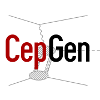General usage#
The installation guide for the library and general examples may be found here.
Several tools are shipped to ease the user interaction with the library.
All of these can be compiled (after the CMake environment is set as described here) through a simple make <tool_name>.
The associated output executable may then be found in your build/ directory.
Conventionally, a make install command can be run, either as administrator to install these system-wise, or locally by overriding the CMAKE_INSTALL_PREFIX environment variable.
For instance, one may find the following:
cepgen(see here) is the main CepGen executable. It allows computing the process cross section and launching an events generation. According to the steering card content, the events may or may not be stored on disk after production. For instance, in the LPAIR process Python steering card, the event content is printed on screen by thedumpmodule every 10’000 generations.A few extra arguments can be passed through the command line. As for other utilitaries, these are generally documented adding the
-h, or--helpflag after the command name. Beside this “help” flag a few additional “standard” flags are handled, i.e.-dor--debugturns on the verbose mode, and produces a lot of useful debugging information-vor--versionshows the compiled CepGen version tag and returns.
For the
cepgenexecutable, one also finds:-ior--configallows to provide the input steering card path,-nor--num-eventslets the user override the number of events to be generated,-oor--outputallows to define a comma-separated list of output modules names to which events shall be fed (with standard parameters values)
In addition, two useful flags are:
-sor--safe-mode, to disable the loading in the runtime environment of all add-ons found, either in thebuilddirectory, or in theCEPGEN_PATH. Useful in the case where a package under its experimental phase is corrupted.-aor--add-ons, to specify a comma-separated list of shared libraries to load at the runtime. For instance in combination to the earlier, it allows to spot precisely which package is inducing an error, or to load new processes generated and pre-compiled externally.
Finally, the
-lor--list-modulesflag allows to dump a list of modules (output, event modification, drawing, functional parser, …) accessible in the runtime environment after the loading of the various shared libraries.cepgenDescribeModulesgives a user-readable description of one, or all modules defined in the runtime environment. The-a, or--allflag produces a complete list of all modules, similar to the one given in this raw list.
We suggest you to use CepGen through the main executable, in combination with the various steering modules available. These are, to explicitely name a few,
Python, structured configurations
JSON, XML, INFO-formatted configurations, as handled by the Boost.PropertyTree serialisation library (requires
CepGenBoostto be loaded).
We can however assist you in producing a packaged version, fitting to your event generation scheme. Please fill in an issue or contact us for more details.
